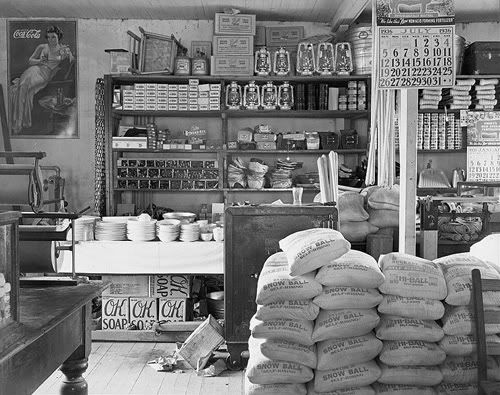I remember interviewing my grandma Sally a while back, and she described living in a small Midwestern town. She talked about how there was a little store that sold groceries: “You know how, today, people go to the grocery store and buy a whole bunch of groceries? Well, what we did was I would send the kids to the store just to get the groceries we needed for that day,” she explained. Back then, grocery clerks knew the residents of the town and would keep a tab for them, which they could settle up at the end of the month, sort of like Olson’s Store in Little House on the Prairie.
It was kind of the same in Fullerton. For many years, the main store people shopped at was called Stern and Goodman’s. They sold almost everything: groceries, farm implements, clothes, shoes, etc. And they would keep a tab for people. Small farmers could come and trade their produce for supplies, sort of like the barter system. People, generally speaking, knew and trusted one another. But somewhere along the line, things began to change, specifically in the grocery business.
Archer W. Kammerer, who lived in Fullerton off and on since 1900, describes this change: “The supermarkets moved in; huge things. They took over the small grocery business. I realized it was different. I used to go to Fullerton to buy something and I would go into the store, buy what I wanted and say, ‘Send the bill.’ I didn’t think anything about it until one time the bill was sent, but I also got a notice to establish credit. That was a jolt to me because I thought I was known around here, but it did not make any difference...I realized that different people were operating the businesses. They didn’t know me” (CSUF Oral History Program 12).
This change, from small locally-owned grocery stores to large corporate-owned ones, is worth considering. How has this change affected the way we eat? How has it affected our community? As I write this, the Fullerton Farmers market is going on—a weekly event where small local farmers can still sell their food. It is very popular. I wonder what the impact would be if this were not a weekly novelty, but rather the way we always got our food—locally. There is certainly a growing feeling among people that this localization might be a good thing—for the community, for the economy, and for our health.
Maybe the old folks had it right.

